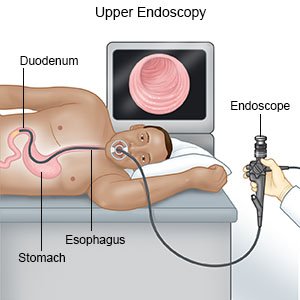Gastric Polyps
Medically reviewed by Drugs.com. Last updated on Aug 4, 2025.
What are gastric polyps?
Gastric polyps are growths that form in the lining of your stomach. They are not cancer, but certain types of polyps can change into cancer.
 |
What increases my risk for gastric polyps?
- Chronic gastritis caused by NSAIDs use or ulcers
- Long-term use of proton pump inhibitor medicines (used to decrease stomach acid)
- An infection in your stomach caused by H. pylori bacteria
What are the symptoms of gastric polyps?
You may have no symptoms. Large polyps may cause any of the following:
- Abdominal pain
- Indigestion
- Vomiting after meals or vomiting blood
- Dark or bloody bowel movements
How are gastric polyps diagnosed?
Gastric polyps are usually found during an endoscopy for another reason. All or part of the polyp will be removed. Your healthcare provider may also remove tissue from your stomach. The polyps and tissue are sent to a lab for testing.
 |
How are gastric polyps treated?
Some types of polyps go away on their own. You may need any of the following for polyps that do not go away:
- Antibiotics may be given if you have an infection caused by H. pylori bacteria.
- Polyp removal may be needed if they are large, you have symptoms, or abnormal cells are found. Large polyps and abnormal cells increase your risk for cancer.
- Surgery may be used to remove part of your stomach if the polyps cannot be removed and abnormal cells are found.
What can I do to manage or prevent gastric polyps?
- Wash your hands often to prevent an H. pylori infection. Use soap and warm water. Use an alcohol-based gel if soap and water are not available. Clean your hands before you eat and after you use the bathroom. Clean your hands after you change a baby's diaper.

- Ask your healthcare provider about medicines before you take them. NSAIDs, such as ibuprofen, can cause stomach bleeding. Your provider may tell you not to use proton pump inhibitors if you have polyps called fundic polyps. He or she can tell you about other medicines you should not take to prevent new polyps.
- Do not smoke. Nicotine and other chemicals in cigarettes and cigars can worsen your symptoms. Ask your provider for information if you currently smoke and need help to quit. E-cigarettes or smokeless tobacco still contain nicotine. Talk to your provider before you use these products.
- Do not drink alcohol. Alcohol may worsen your symptoms. Alcohol also increases the risk for cancer of the esophagus or stomach. Ask your provider for information if you currently drink alcohol and need help to quit.
When should I seek immediate care?
- You have blood in your vomit.
- You have dark or bloody bowel movements.
- You have severe pain in your abdomen that does not go away after you take medicine.
When should I call my doctor?
- You have indigestion that does not go away with treatment.
- You vomit after meals.
- You have questions or concerns about your condition or care.
Care Agreement
You have the right to help plan your care. Learn about your health condition and how it may be treated. Discuss treatment options with your healthcare providers to decide what care you want to receive. You always have the right to refuse treatment. The above information is an educational aid only. It is not intended as medical advice for individual conditions or treatments. Talk to your doctor, nurse or pharmacist before following any medical regimen to see if it is safe and effective for you.© Copyright Merative 2025 Information is for End User's use only and may not be sold, redistributed or otherwise used for commercial purposes.
Further information
Always consult your healthcare provider to ensure the information displayed on this page applies to your personal circumstances.
